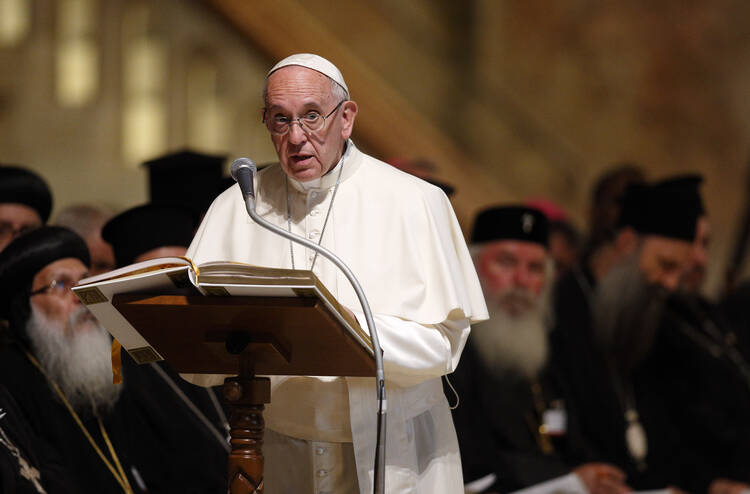Pope Francis said he will never give up calling for stronger efforts to bring peace to the Middle East and for people to stop being indifferent to the fate of the region's people.
"My daily prayer to God," he said, is "to inspire the minds and hearts of all who have political responsibility, that they may be able to renounce their own interests in order to achieve the greater good–peace."
The pope spoke during a private audience on Sept. 29 at the Vatican with bishops, priests, religious and lay Catholics who provide pastoral and humanitarian assistance to those in need in Syria, Iraq and neighboring countries.
Despite many efforts to alleviate people's suffering, he said, sadly "the logic of weapons and oppression, hidden interests and violence continues to wreak devastation on these countries and, even now, we have not been able to put an end to the exasperating suffering and repeated violations of human rights."
Why, he asked, "even at the cost of untold damage to persons, property and the environment, does humanity continue to pursue abuses of power, revenge and violence?"
The endless cycle of violence almost makes it seem like the world is "caught up in a spiral of arrogance and inertia from which there is no escape," he said.
What people in Syria and Iraq want more than anything else—beyond the needed humanitarian aid—is peace, he said.
"And so I will never tire of asking the international community for greater and renewed efforts to achieve peace throughout the Middle East, and of asking not to look the other way."
Ending conflict also lies in human hands, he said, so every individual "can and must become a peacemaker."
"This evil which grips our will and conscience should challenge us," the Pope said, and make people reflect how such evil must be redeemed.
The Year of Mercy highlights how divine mercy is ultimately the only power that can limit evil, he said. "Yes, the answer to the drama of evil lies in the mystery of Christ."
The work of so many people on the ground helping refugees and those in need, and protecting their dignity, the pope said, "is certainly a reflection of God's mercy and, as such, a sign that evil has limits and does not have the last word."
"In the midst of so much darkness," Christians in the Middle East "hold high the lamp of faith, hope and charity" as they help everyone–with courage and without discrimination, he said.
Pope Francis entrusted the communities in crisis and those who are helping them to the intercession of St. Teresa of Kolkata, "exemplar of charity and mercy."
He also thanked and encouraged international organizations, in particular the United Nations, for their work and efforts at mediation.
Reaching agreements that end conflicts and protect the defenseless, he said, requires taking "a path we must travel together with patience and perseverance, but also with urgency, and the church will certainly continue to make her contribution."
Staffan de Mistura, the United Nations' special envoy to Syria, was among about 100 people at the papal audience. The group was at the Vatican for a follow-up meeting, sponsored by the Pontifical Council Cor Unum, to study the church's priorities and response to the crises in the region.
Archbishop Alberto Ortega Martin, nuncio to Iraq and Jordan, told reporters at the meeting venue Sept. 29 that helping Christians return to their homes or communities was a priority in areas where the fighting has abated.
However, for Christians to return or remain, they need guarantees of security, proper housing and food, he said.
Christians returning to homes that have been ransacked or pillaged would face the additional challenge, he said, of being witnesses to mercy by showing "no rancor" for having lost everything.
They will also play a crucial role in reconciliation and rebuilding, he said, because of the Christian tradition of being committed to dialogue, "being open to the other, forgiveness and non-discrimination."
More than 13.5 million people are in need of help in Syria, and there are at least 10 million people in need in Iraq, Cor Unum said in a press handout.
The Catholic Church's network of people on the ground in the region includes more than 4,000 professional staff and 8,000 volunteers, it said, as well as the many priests and religious working in the area.
In 2015, the Catholic Church mobilized more than $207 million in aid, which helped more than 4.5 million people, it said.
The money was used to fund education, food and other material, health care, shelter and rent. The amount of money being gathered and the number of people being helped for 2016, it said, was expected to exceed last year's figures.








